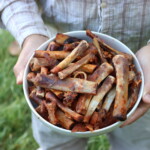Rib Broth
Rib Broth is a great way to get one more use out of leftover rib bones. This recipe is written to make 1 gallon of rich, flavorful stock. But quantities for a single quart of stock with just 1 lb of bones are in the notes. If canning, the minimum batch size is 2 quarts.
Servings: 16 Cups, or 4 quarts/1 gallon
Equipment
- Stock Pot
Ingredients
- 4 lbs bones either beef or pork, or a combination
- 4 medium celery rib chopped
- 4 small carrot or two large carrots, peeled and chopped
- 4 small onions or two large onions, peeled and chopped
- 4 whole bay leaves
- 10 to 20 whole peppercorns
- 1/2 to 1 tsp salt adjust to taste
- 1 ½ to 2 gallons water
Instructions
- Roast bones at 400°F for 30-45 minutes (if raw).
- Add bones, vegetables, bay leaf, peppercorns, and salt to a large pot.
- Cover with 1 ½ to 2 quarts water. Bring to a boil, then reduce heat to simmer.
- Simmer for 4-6 hours, skimming occasionally.
- Strain stock through a fine-mesh sieve. Use immediately, or can using a pressure canner for long-term storage.
- If canning, prepare a canner, jars and rings at this point. Process pints for 20 minutes, quarts for 25 minutes (adjust for altitude, see notes).
Notes
Ingredients per Quart
To make a single quart of flavorful rib stock, you will need:- 1 pound bones (either beef or pork, or a combination)
- 1 celery rib, chopped
- 1 small carrot (or half a large carrot), chopped
- 1 small onion (or half a large onion), peeled and chopped
- 1 bay leaf
- 5 whole peppercorns
- ⅛ to ¼ teaspoon salt, adjust to taste
- 1 ½ to 2 quarts water
Altitude Adjustments
Pressure remains the same, but processing pressure increases with elevation: Dial Gauge Canners-
- 0–2,000 ft: 11 lbs
-
- 2,001–4,000 ft: 12 lbs
-
- 4,001–6,000 ft: 13 lbs
-
- 6,001–8,000 ft: 14 lbs
-
- Above 1,000 ft: 15 lbs
-
- 0–1,000 ft: 10 lbs
Nutrition
Calories: 15kcal | Carbohydrates: 3g | Protein: 0.4g | Fat: 0.1g | Saturated Fat: 0.03g | Polyunsaturated Fat: 0.03g | Monounsaturated Fat: 0.01g | Sodium: 95mg | Potassium: 78mg | Fiber: 1g | Sugar: 1g | Vitamin A: 2112IU | Vitamin C: 2mg | Calcium: 21mg | Iron: 0.2mg
